reading第六版
- 格式:doc
- 大小:19.06 KB
- 文档页数:3
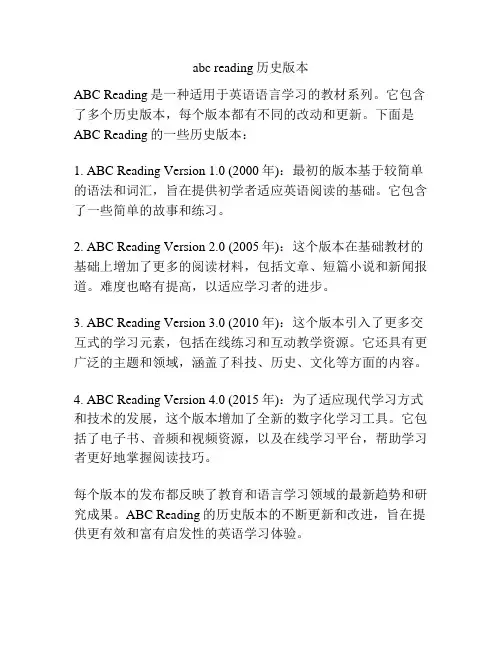
abc reading历史版本
ABC Reading是一种适用于英语语言学习的教材系列。
它包含了多个历史版本,每个版本都有不同的改动和更新。
下面是ABC Reading的一些历史版本:
1. ABC Reading Version 1.0 (2000年):最初的版本基于较简单的语法和词汇,旨在提供初学者适应英语阅读的基础。
它包含了一些简单的故事和练习。
2. ABC Reading Version 2.0 (2005年):这个版本在基础教材的基础上增加了更多的阅读材料,包括文章、短篇小说和新闻报道。
难度也略有提高,以适应学习者的进步。
3. ABC Reading Version 3.0 (2010年):这个版本引入了更多交互式的学习元素,包括在线练习和互动教学资源。
它还具有更广泛的主题和领域,涵盖了科技、历史、文化等方面的内容。
4. ABC Reading Version 4.0 (2015年):为了适应现代学习方式和技术的发展,这个版本增加了全新的数字化学习工具。
它包括了电子书、音频和视频资源,以及在线学习平台,帮助学习者更好地掌握阅读技巧。
每个版本的发布都反映了教育和语言学习领域的最新趋势和研究成果。
ABC Reading的历史版本的不断更新和改进,旨在提供更有效和富有启发性的英语学习体验。
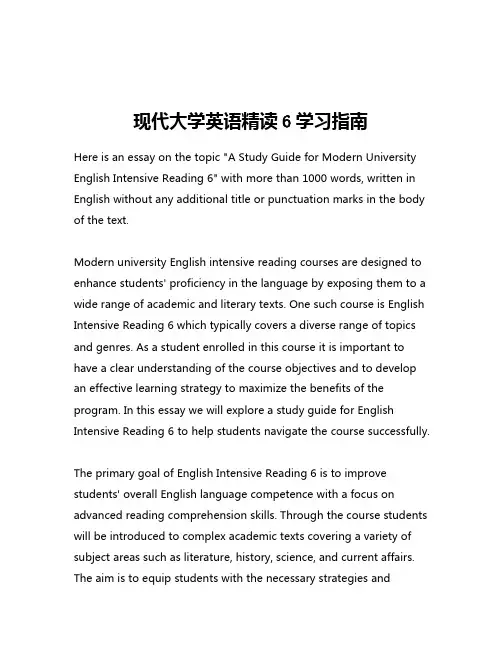
现代大学英语精读6学习指南Here is an essay on the topic "A Study Guide for Modern University English Intensive Reading 6" with more than 1000 words, written in English without any additional title or punctuation marks in the body of the text.Modern university English intensive reading courses are designed to enhance students' proficiency in the language by exposing them to a wide range of academic and literary texts. One such course is English Intensive Reading 6 which typically covers a diverse range of topics and genres. As a student enrolled in this course it is important to have a clear understanding of the course objectives and to develop an effective learning strategy to maximize the benefits of the program. In this essay we will explore a study guide for English Intensive Reading 6 to help students navigate the course successfully.The primary goal of English Intensive Reading 6 is to improve students' overall English language competence with a focus on advanced reading comprehension skills. Through the course students will be introduced to complex academic texts covering a variety of subject areas such as literature, history, science, and current affairs. The aim is to equip students with the necessary strategies andtechniques to critically analyze challenging reading materials and extract key information effectively.One of the key aspects of the course is the development of advanced vocabulary skills. Students will be exposed to a wide range of academic and subject-specific terminology which they must be able to comprehend and utilize appropriately in their own writing and discussions. This involves not only memorizing the definitions of new words but also understanding their contextual usage and semantic relationships. Systematic vocabulary building exercises and regular quizzes will be an integral part of the course curriculum.In addition to expanding their lexical knowledge students will also work on enhancing their reading comprehension abilities. This will involve learning and practicing various reading strategies such as skimming, scanning, intensive reading, and critical reading. Students will learn how to identify the main ideas, supporting details, and underlying arguments in complex texts. They will also develop the skills to recognize the author's purpose, tone, and perspective which are crucial for a deeper understanding of the material.Another important component of English Intensive Reading 6 is the development of academic writing skills. Students will be required to produce a variety of written assignments such as summaries, critiques, and research-based essays. These writing tasks aredesigned to not only assess the students' comprehension of the reading materials but also their ability to organize their thoughts coherently, construct logical arguments, and communicate effectively in written English.To succeed in this course students must adopt an active and engaged approach to learning. This means consistently completing all assigned readings, actively participating in class discussions, and diligently working on the writing assignments. It is also important to develop effective time management skills to ensure that all coursework is completed on time.Regular practice is key to improving one's English proficiency. Students should make it a habit to read extensively both inside and outside the classroom setting. This could involve reading academic journals, newspapers, magazines, or even literary works. Additionally students should engage in regular writing practice by keeping a journal, writing summaries of articles, or attempting sample essay questions.Another crucial aspect of succeeding in English Intensive Reading 6 is effective note-taking. Students should develop the habit of taking detailed and organized notes during lectures and class discussions. These notes can serve as valuable study resources when preparing for exams or working on writing assignments. Students should alsolearn how to effectively annotate the texts they read in order to highlight key information, identify important arguments, and record their own insights and reflections.Active engagement with the course material is also critical. Students should not passively read the texts but rather approach them with a critical eye. This involves formulating questions, making connections to prior knowledge, and analyzing the author's perspectives and rhetorical strategies. Engaging in such active reading practices will not only deepen the students' understanding of the material but also prepare them for the rigorous demands of academic discourse.Finally it is important for students to seek out additional support and resources whenever needed. This could involve regularly consulting with the course instructor during office hours, participating in peer study groups, or utilizing the university's writing center or language learning lab. Taking advantage of such resources can go a long way in helping students overcome any challenges they may face and succeed in the course.In conclusion English Intensive Reading 6 is a challenging yet rewarding course that can significantly enhance students' English language proficiency. By adopting an active and engaged approach to learning, developing effective study habits, and seeking out additional support, students can navigate the course successfully andemerge as more confident and competent users of the English language. The skills and strategies acquired in this course will not only benefit students academically but also prepare them for the demands of the professional world.。
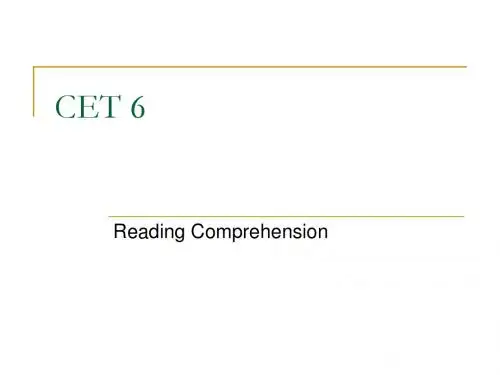


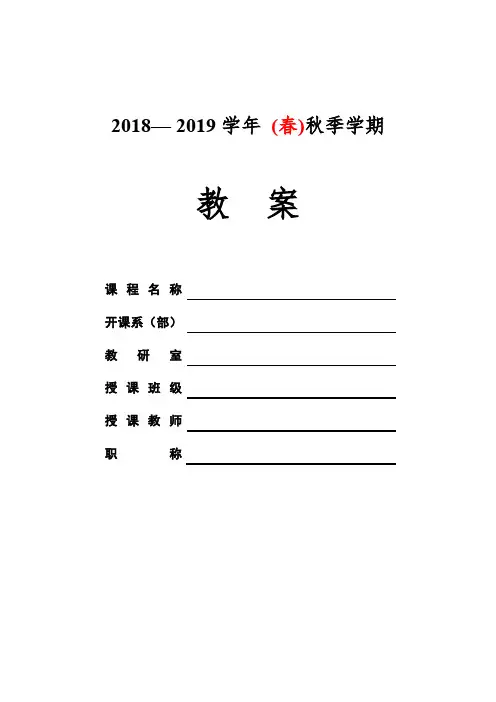
2018— 2019学年(春)秋季学期教案课程名称开课系(部)教研室授课班级授课教师职称课程基本情况(简单介绍本课程的总体目标和要求)Unit 1 Western Cultures1、2课时教案注:mins=minutes3、4课时教案5、6课时教案Unit 2 Making Introductions1、2课时教案注:mins=minutes3、4课时教案5、6课时教案Unit 3 Telephone Etiquette1、2课时教案注:mins=minutes3、4课时教案5、6课时教案lack 不是形容词,因此没有be lack of的用法。
lacking adj.☆ He was lacking in confidence. 他缺乏自信。
therebyadv. [formal] as a result of this action因此,从而☆ Diets that are high in saturated fat and cholesterol tend to clog up our arteries, thereby reducing the blood flow to our hearts and brains.饱和脂肪和胆固醇含量高的饮食会阻塞动脉,从而减少流向心脏和大脑的血液。
☆ He wished to travel and thereby study the customs of other countries.他希望去旅游,从而研究其他国家的民俗风情。
4. Add to this the typical hectic pace of business communication, and you have a particularly difficult situation.this指代前一句话提到的状况;the typical hectic pace of business communication 是add的宾语,由于太长,所以后置;句中and表示条件和结果,在祈使句后,常用and连接一个简单句,表示条件与结果的关系,它们在语法上是并列关系,但在意义上却是主从关系,也可译为“如果……就……”。
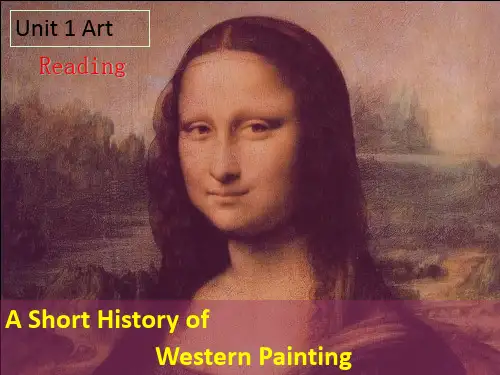


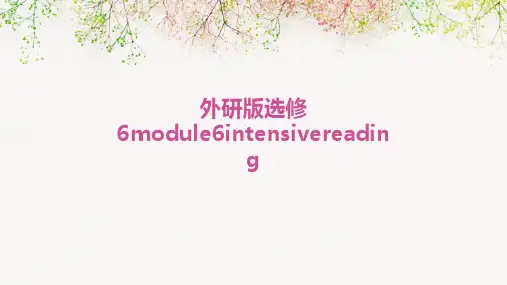
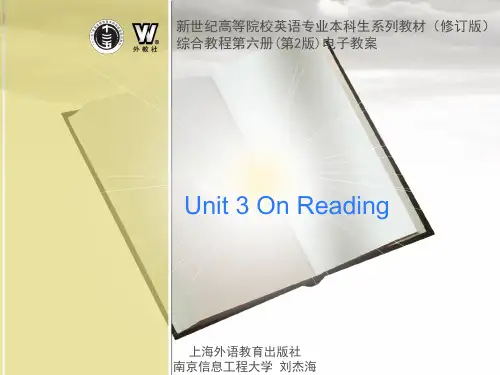
⼤学综合教程第六册onreadingOn Reading罗琴刘春玲唐海浪Do you find reading enjoyable?why or why notWhat are the two books do you like bestCould you mention one or two books that you find most enjoyable to read Reading is so important to us,and almost everyone is involved in some kind of reading. As a way of diversion,reading is usually relaxing and enjoyable.However,can reading always be an enjoyable experience?If not,when and why?Part 1(Para 1) defines the scope of this passagePart 2(Para2)specifies the readers who are eligible to read the booksPart 3(Para3)touches on the criterion of book selectionPart 4(Para4)the relationship between intellectual pleasure and the habit of readingPart 5(Para5)the author continues his discussion on the habit of readingPart 6(Para6)discussion of an important reading skill—skippingW.Somerset Maugham (1874–1965),British novelist,one of the most popular writers in England in the20th century,is noted for his clarity of style and skill in storytelling.His best-known works include Of Human Bondage(1915), The Moon and Sixpence (1919),Ashenden:or,The British Agent(1928),and Cakes and Ale:or,The Skeleton in the Cupboard (1930).ON READING1.The first thing I want to insist on is that reading should be enjoyable. Of course, there are many books that we all have to read, either to pass examinations or to acquire information, from which it is impossible to extract enjoyment.We are reading them for instruction, and the best we can hope is that our need for it will enable us to get through them without tedium. Such books we read with resignation rather than with alacrity. But that is not the sort of reading I have in mind.The books I shall mention in due course will help you neither to get a degree nor to earn your living.They will not teach you to sail a boat or get a stalled motor to run,but they will help you to live more fully.That, however,they cannot do unless you enjoy reading them.⾸先,我要强调的是,读书本应是⼀种享受。
Unit 10 MONEYLesson1 A Material World教学设计I .Teaching aims:1. To practice reading skills.(训练阅读技巧)2. To read a text to find out specific facts.(读课文找信息)3. To practise the use of phrasal verbs with give, go and drop.(学会运用词组)4. To learn different lifestyles of some millionaires.(了解百万富翁的生活方式)5. To learn western people’s attitude towards money.(了解西方国家对金钱的看法)6. To lead students to build up correct attitude towards money.(引导学生树立正确的金钱观)II. Teaching stresses:Understand the text.Use the information from the text to finish some exercises.Learn to use phrasal verbs.Help students build up correct attitude towards money.III. Teaching difficulties:To use phrasal verbs correctly.Help students build up correct attitude towards money.III. Teaching methods:Task-based teaching(任务型教学法)Communication teaching(交际型教学法)IV. Teaching aids: MultimediaV. Teaching procedures:Step 1 Warm-up(导入——观看学生课前采访关于是否想成为百万富翁的视频)Look at video and pay attention to each one’s answersQuestions:Would you like to be a millionaire? Why or why not?Do you know any millionaires? Do you think they are happy?What can money buy? What can’t money buy?Step 2 Reading comprehension:(阅读理解)Task 1: fast reading(快速阅读)Match the main idea with each paragraphsPar.1 a. the reason why he changed his lifePar.2 b. different attitudes about moneyPar.3 c. enjoying the changePar.4 d. attitude (determined to be a millionaire)Par.5 e. donating his moneyPar.6 f. Charles’s living conditionTask 2: detailed reading(细读)Read the article. Decide if the statements below are true (T), false (F) or there is no information (NI)1.Charles Gray was a rich businessman.2.He hasn’t got a TV in his dormitory .3.He has got a vegetable garden4.Charles gave his money away to poor people5.People thought he was crazy when he gave away small bank notes in the street.6.He was happier when he was rich.Setp3. Careful readingRead the text again and choose the best answer according to the text.1. A lot of people want to be a millionaire, but when they achieve this goal, ________________.A. it's not certain that they find the happiness they thought.B. all of them continue to be concerned about money.C. they won't be hardworking.D. all of them turn their backs on their millions.2. Now, Charles Gray is _____________.A. a businessman who owns $ 2 million.B. a professor with $ 2 million.C. not a millionaire any longer, but he gets more happiness than before.D. a rich man who lives in a six-bedroom house3. The phrase "turned their backs on" in paragraph 2 means ___________________ according to the context.A. refusedB. turned aroundC. turned backD. confused4. Why did Charles Gray give up the lifestyle of a rich man?A. He was afraid of his money being stolen.B. He was crazy.C. He didn't want to be hardworking to make sure he never lost his money.D. He was tired of being a person who had everything in a world where many people had nothing.5. Which one is NOT true in the following sentences?A. Today Charles lives in a small dormitory room.B. When Charles had two thousand dollars left, he gave away small bank notes in the streets of local poor areas.C. Charles was happier when he was rich.D. Charles grows some vegetables and a few flowers.Step4 SummaryA lot of people are ________ to become a millionaire.They hope to do all the ________ things once they got rich.Actually, some millionaires _______ to be concerned about money, so they are hardworking to make sure they never lose it.However, there are some people ________ don't want to be a millionaire.Charles Gray is one example.Charles Gray was a millionaire sixteen years ago, but he was tired of ________ a person who had everything in a world ________ many people had nothing. So he gave all his money________ to charities.Charles now lives in a small dormitory room where there is only ________ furniture.Though he has given away all his money, he lives a ________ life than before.When asked whether there were any things he missed, he replied he wouldn't go back to ________ rich for anything.Step5.Group workDivide students into 2 groups to discuss the advantages and disadvantages of becoming rich(use a mind map)Step6.Homework1. Write a short passage according to what we discussed.2. Preview the language points in the text.感谢您的阅读,祝您生活愉快。